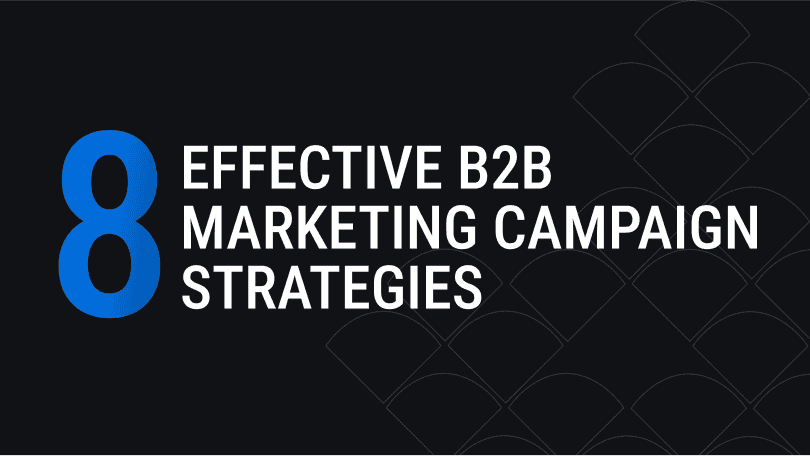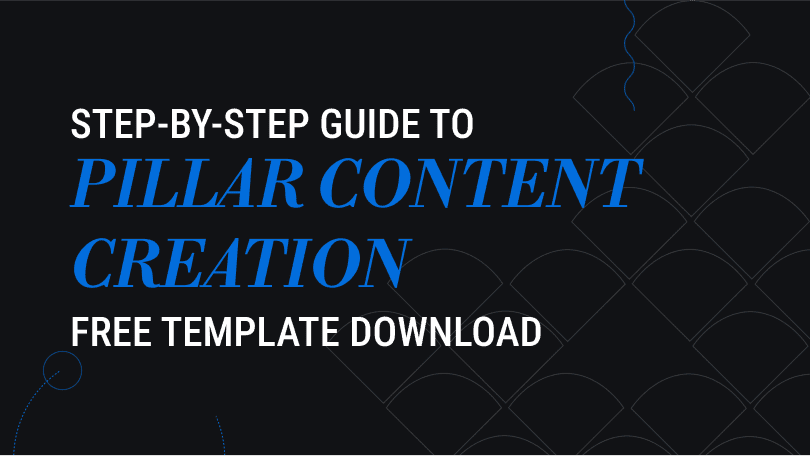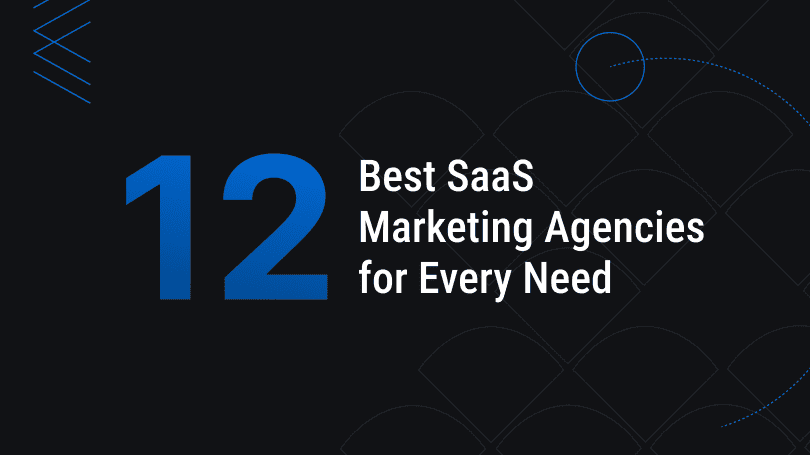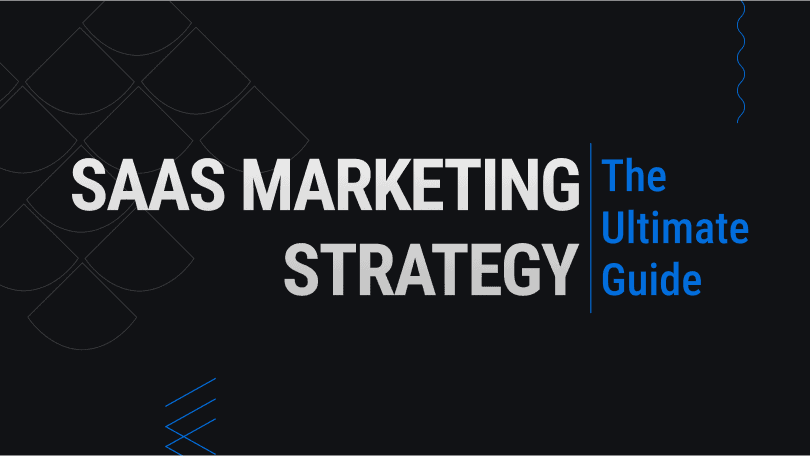It’s essential not only to create a stellar B2B product or service but also to ensure it reaches the right stakeholders. The ultimate goal is to gain paying customers, and that’s where effective B2B marketing plays a crucial role. By targeting the ideal customer and strategically placing your product in front of them, B2B marketing ensures your offerings don’t go unnoticed.
In this article, we’ll delve into what successful B2B marketing campaigns include and present eight diverse campaign ideas, each illustrated with real-world examples.
What is a B2B Marketing Campaign?
A B2B marketing campaign is a strategic plan aimed at engaging a target audience within the business-to-business (B2B) sphere through tailored messaging. These campaigns are tailored to address the specific needs and pain points of companies, rather than individual consumers. By aligning messaging with the buying process of B2B companies, these campaigns aim to generate leads and drive conversions among stakeholders.
Elements of a Successful Campaign
The core elements of any successful B2B marketing campaign include:
- Understanding the buying process of B2B customers: This involves detailing buyer personas and comprehending their decision-making dynamics, including the involvement of multiple stakeholders and the evaluation of long-term benefits.
- Addressing customer pain points with carefully crafted messaging: B2B customers are often driven by specific challenges or inefficiencies within their operations, and an effective campaign should speak directly to these pain points, offering solutions and value propositions that resonate deeply.
- Choosing the right marketing channels for your campaign: By strategically aligning your messaging with the channels most frequented by your target audience, you can maximize the impact and reach of your campaign.
In addition to these foundational elements, drawing inspiration from successful strategies in B2C marketing can infuse creativity and innovation into your B2B campaigns, further enhancing their effectiveness.
8 B2B Marketing Campaign Strategies to Consider
Exploring diverse marketing strategies is essential for a comprehensive B2B marketing approach. Here are eight strategic approaches to consider for your B2B marketing campaigns:
1. Consider Pay-Per-Click (PPC) Ads
One powerful strategy in the realm of B2B marketing is harnessing the potential of Pay-Per-Click (PPC) advertising campaigns. This approach offers a dynamic way to expand your reach and drive success in digital marketing endeavors.
PPC ads present an exceptional opportunity to attract new audiences while also engaging with existing leads. By leveraging paid ad platforms like Google and Bing, you can precisely target your desired demographics, ensuring your ads are seen by those most likely to convert. Additionally, social media platforms such as Facebook and LinkedIn offer robust PPC advertising options, allowing for tailored campaigns aimed at specific professional audiences.
Example: Consider the success story of Five Tool Agency, whose collaboration with BuildOps resulted in an impressive 700% return on ad spend. Through strategic PPC campaigns, they effectively drove traffic to BuildOps’ landing pages, converting leads into paying customers. This case study exemplifies how PPC advertising, when executed with precision and backed by insightful metrics, can yield remarkable results in acquiring new customers.
Explore our BuildOps case study for deeper insights into the effectiveness of PPC campaigns in driving business growth.
2. Start an Email Campaign
Email campaigns stand as a cornerstone of effective B2B marketing efforts, offering a direct and personalized channel to engage with prospects and nurture leads throughout the buyer journey.
A well-crafted email campaign has the power to establish a company as an authority in its niche while keeping the brand top of mind for potential customers. By consistently delivering valuable content and insights, B2B businesses can foster trust and credibility among their target audience, ultimately driving conversion and loyalty.
Email campaigns are perfect for reusing content published elsewhere, making the most of each blog, podcast, or webinar your team worked so hard on. They’re also a great way to A/B test new ad campaign designs and wording on an existing audience to see which combination of copy and graphics result in the highest clicks—preventing you from spending real campaign dollars on untested social media marketing campaigns.
Example: The Mutiny newsletter has earned recognition for its effectiveness as a marketing tool. Through strategic use of email marketing, Mutiny has succeeded in delivering tailored content that resonates with its audience, leveraging platforms like Mailchimp to optimize engagement and conversion rates.
3. Offer a Free Tool or Guide
For B2B brands looking to boost lead generation and establish themselves as industry leaders, providing free tools or guides can be a highly effective strategy. This approach not only enhances brand recognition but also serves as a powerful lead generation tool.
By providing valuable resources such as marketing tools, white papers, or detailed guides, B2B brands can attract potential customers who are seeking solutions to their challenges. Offering something of value for free not only positions the brand as a trusted authority but also initiates the process of lead generation by capturing the interest of potential clients.
Example: HubSpot’s marketing plan template generator, which effectively drives new leads for the company. This free tool assists small businesses in crafting comprehensive marketing plans tailored to their needs. By offering a valuable resource to their target audience, HubSpot not only enhances brand visibility but also generates potential leads who are likely to engage further with their offerings.
4. Build Out a Content Marketing Strategy
An intentional and robust B2B content marketing strategy is basically a requirement for long-term success and growth. Content, often hailed as king, serves as a potent tool for engaging B2B customers, supporting sales efforts, and ultimately driving conversion.
A well-executed content marketing strategy not only acts as a traffic growth engine through effective search engine optimization (SEO) practices but also plays a crucial role in guiding potential customers to make a purchasing decision. By offering insightful and relevant content, B2B marketing teams can influence customer perceptions, build trust, and increase conversion rates. And while scaling content creation can be difficult with limited resources, taking the time to optimize processes now can result in long-term benefits.
Example: Zapier’s content strategy has been lauded for its effectiveness in engaging B2B audiences. Zapier’s blog features a wealth of valuable content that addresses diverse pain points and challenges faced by its target audience, ultimately driving traffic and supporting sales efforts.
5. Take Advantage of User-Generated Content (UGC)
User-generated content (UGC) created by your own customers or users is a free and easily accessible goldmine of authenticity and social proof. By incorporating UGC into their marketing campaigns, B2B companies can build credibility, trust, and authenticity, ultimately driving success in their marketing endeavors.
UGC comes in various forms, including testimonials, reviews, case studies, and even social media posts. B2B companies can encourage their customers to share their experiences and insights, creating a rich tapestry of high-quality content that resonates with their target audience. This content serves as a powerful endorsement, as people tend to trust recommendations and reviews from their peers more than traditional advertising.
Example: Notion harnesses the power of UGC on social media platforms like X (formerly Twitter), where they repost helpful or promotional content shared by users. This not only amplifies the reach of their message but also fosters a sense of community and engagement around their brand.
6. Optimize Social Media Engagement
Harnessing the organic power of social media engagement stands as a pivotal strategy for B2B businesses to connect with both current and potential customers. By actively engaging on various social media platforms, companies can foster meaningful relationships, showcase expertise, drive brand awareness, and support ongoing marketing endeavors. Of course, each platform has its own audience and opportunities and should be treated differently.
- LinkedIn serves as a hub for thought leadership content, where B2B businesses can share insights, industry news, and LinkedIn articles to position themselves as industry leaders. Additionally, maintaining a robust company page and cultivating a strong personal brand for founders can further enhance visibility and credibility.
- X allows B2B companies to leverage informative tweets, utilize relevant hashtags, and engage with industry influencers to amplify their message and reach a wider audience.
- YouTube offers an ideal platform for B2B businesses to showcase their products and expertise through product demos, how-to videos, and educational content.
- Facebook presents opportunities for B2B engagement through Facebook groups and Facebook Live sessions, fostering community engagement and facilitating direct interaction with customers.
Example: Caterpillar Inc excels in social media engagement across various platforms. Their social media channels feature a diverse array of content, from industry updates on LinkedIn to captivating visuals on Instagram and informative videos on YouTube.
7. Implement Account-Based Marketing
In the realm of B2B marketing, particularly when targeting enterprise accounts or larger contract values, personalization and tailored solutions are paramount. This is where account-based marketing (ABM) emerges as a highly effective strategy.
ABM involves targeting specific high-value accounts and customizing marketing efforts to resonate with the unique needs and challenges of each account. By focusing resources on a select group of ideal customers, rather than casting a wide net, ABM allows for more personalized and impactful marketing interactions.
Example: Intridea leveraged account-based marketing for Ogilvy & Mather. By crafting a highly personalized marketing plan tailored to Ogilvy & Mather’s needs and preferences, Intridea was able to engage decision-makers effectively and provide solutions that addressed their specific pain points. This approach not only strengthened the customer experience but also positioned Intridea as a trusted partner capable of delivering value.
8. Explore Strategic Partnerships
In the dynamic landscape of B2B marketing, strategic partnerships emerge as a powerful avenue for driving success and expanding reach. By collaborating with complementary businesses and influential figures, organizations can tap into new audiences, connect with potential customers, and foster mutually beneficial relationships.
- Affiliate programs enable businesses to incentivize partners to promote their products or services, driving traffic and generating leads through referral channels.
- Connecting with influencers allows brands to leverage the reach and credibility of prominent figures in their industry, gaining access to their followers and enhancing brand visibility.
- Sponsorships for relevant events, conferences, trade shows, publications, and workshops provides opportunities for businesses to showcase their expertise, engage with key stakeholders, and establish themselves as industry leaders.
Example: QuickBooks does a fantastic job of leveraging its Business Affiliate Program to gain new customers. By offering incentives to partners who refer customers, QuickBooks expands its outreach and drives acquisition through strategic partnerships.
Creating a Cohesive B2B Marketing Strategy
While each of the individual B2B marketing campaign ideas above hold their own merit, they should be used in conjunction with a well-planned and tailored marketing strategy to achieve business goals effectively. A successful B2B marketing strategy involves thorough research, clear goal-setting, audience segmentation, messaging alignment, and performance tracking. Once a strategy is formulated, selecting specific campaign ideas tailored to the company’s needs becomes crucial.
If you’re a B2B SaaS company, Five Tool can assist in curating a comprehensive marketing strategy that does all of those things. Our services include website optimization, PPC, organic content marketing, and more, ensuring a cohesive and effective marketing platform that gets results.
Explore the different Five Tool Agency services that can take your B2B marketing campaigns up a notch — or set up a phone call for personalized feedback on how we can help.




